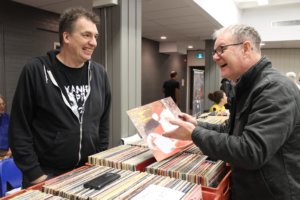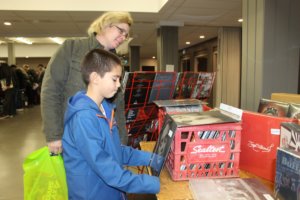Although their business has been affected by the rise in popularity of music streaming and downloading, traditional brick and mortar record stores continue to thrive in Southern Ontario.
For Michael Todd, owner of London’s longest running record store Speed City Records, the CD market was hit the hardest, so much so that he has phased selling CDs out.
“Compact discs are not something people want to spend their money on anymore,” Todd said as he sold records at the London Record show held at Centennial Hall on Sunday Oct. 28. “It has shrunk the business in some respects, it’s become a niche business. Music retail isn’t what it was in 1993 or 1994 when CD was king. However, the resurgence of vinyl has brought it up to a new level but it’s nowhere near the levels they were in the early nineties.”
At Kitchener’s longest running record store Encore Records, open since 1981, business has been affected by technology too, but for them their CD sales have remained the dominant part of their business. In fact, Chris Boyne who has worked at the store for 15 years, estimates about 70 per cent of their sales are CDs.
“The people who still buy physical product, the majority buy CD,” Boyne said. “People who buy records are very fickle and that changes really quickly – not to sound negative or anything.”
Todd says that vinyl never really went away but the music business has started putting more emphasis on it in recent years with the industry pushing Record Store Day, an industry wide marketing day that encourages music lovers to support Mom and Pop record stores.

“There is a lot of middle age folks that are trying to relive some of their childhood,” Todd said. “Vinyl is an iconic piece of popular culture, you see it in advertising, we see it in iconic movies. It is a human condition – we’re conditioned to do what we’re told to do and right now in a lot of media and what people see they are told vinyl is something to possess, hold onto and enjoy.”
Boyne said the majority of people buying vinyl at Encore Records are also older.
“It’s people who want a connection to music that they feel like they’ve lost but they only buy stuff they really already love,” he said. “Reissues do really well when people don’t complain we don’t have an original pressing, or you have to pay $40. Even when you show them a calculator – in 1988 you would have paid this for it – it’s the same when you take inflation into account. There is no difference.”
Todd has also found that younger people are getting into collecting records.
“It’s weird but it’s happening,” he said. “As for how long it’s going to happen; I don’t know but it’s going on.”
As if on cue a young boy named Logan, and his mother Shannon walked up to Todd’s table at the record show. In a quiet voice Logan asked if Todd had Adele’s albums 19, 21 and 25. Logan was elated when Todd showed him he had all three records in stock. Shannon said she likes the connection of listening to music on vinyl with her son.

One change Boyne mentioned with the rise of digital platforms such as Spotify is that new release day has lost its impact.
“New release day means nothing anymore which is really a kick in the pants,” he said. “Whether or not a record is going to do well, people are spending Friday listening to it and figuring out whether or not they want it.”
Speed City Records has been serving music fans in London since 1997. It first opened right downtown and gained notoriety when Todd would advertise on t-shirts that is was located in “s****y downtown London Ontario.” Twelve years ago he decided to move the store out of London’s downtown core.
“It was also a good idea making it friendlier and easier for people to bring me records,” Todd said. “That really made a big difference. The whole thing changed the store to be not just a record store, but to keep a focus on and learn from antique dealers. Take a model on that you make your money when you buy it as opposed to when you sell it. It’s a different take on it. It’s a different attitude about it and it’s what you have to apply to this business to survive.”
Both Todd and Boyne said that even though their business has been affected by online music platforms that does not stop them from enjoying some of their music online.
“I listen to internet radio out of convenience and I enjoy it,” Todd said. “Certain internet radio stations I really like that I listen to in the backyard or sometimes when I’m working in the store and I don’t feel like spinning records. I’m not a Spotify guy. I don’t have Spotify … and I don’t download music, I never have.”
For Boyne, online music is a good way to find out what new music to stock in the store.

“When people ask about stuff and I don’t know anything about it I can at least check it out,” he said. “I can see if it’s something that I can tell people are going to like that generally shop here. That’s who we cater to the most – people who come in and care.”
Encore Records have been working hard to make all their inventory available on their website.
“The people who use it absolutely freaking love it,” Boyne said. “Our entire vinyl catalog – I haven’t put 7” records up yet but all our albums are online and so far, it’s worked out really well … I get orders from people not that far away – within the city just because our prices can be much better than a lot of other prices, even adding on the extra $12 or $13 to ship a record is still cheaper than buying off Amazon.”
“The secret is to make less money than everyone else,” Boyne laughed to himself. “There is no real secret to that. We’re just poor. It’s all about staying open and supporting artists – it’s hard to do.”

